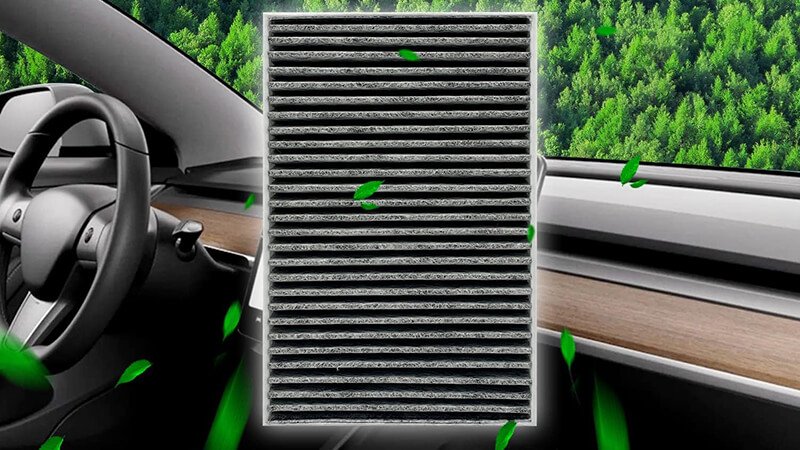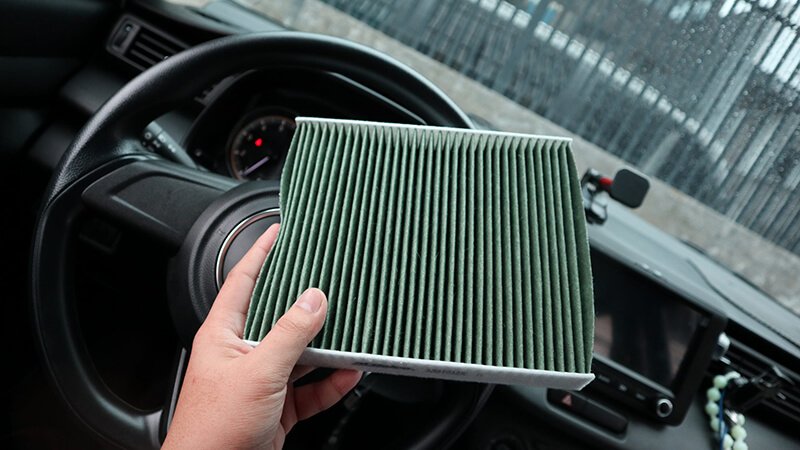If you're considering improving your vehicle's air quality, a carbon cabin air filter might be just what you need. It not only helps filter out pollutants but also enhances the overall air inside your car. So, is it really worth the investment?
A carbon cabin air filter can significantly improve air quality by removing pollutants and odors from the air entering your car. This makes it an essential upgrade for those who want a cleaner and healthier driving experience.
Now that you know the potential benefits, let's explore in more detail whether a carbon cabin air filter is the right choice for your vehicle. We’ll dive into what makes it different and if it’s worth upgrading from your current filter.

Is it worth getting a carbon cabin filter?
When it comes to air quality1, the choice of cabin air filter2 can make a big difference. Many car owners wonder if investing in a carbon cabin filter3 is really worth it. Let’s break down the key benefits and considerations.
A carbon cabin filter is especially effective at trapping odors and harmful particles, which makes it a great choice for drivers who want to maintain fresh, clean air in their car. It can be particularly beneficial in urban environments with higher pollution.
Benefits of Carbon Cabin Air Filters
Carbon cabin filters are unique because of their ability to filter both gases and particulate matter, offering multiple advantages over traditional air filters. Below is a detailed breakdown of why choosing a carbon filter may be beneficial for your vehicle:
| Benefit | Explanation |
|---|---|
| Odor Neutralization | Carbon filters effectively neutralize unpleasant odors such as smoke, food, and pet smells. |
| Enhanced Air Quality | The activated carbon layer adsorbs gases like carbon monoxide and volatile organic compounds (VOCs). |
| Health Benefits | By removing harmful particles and pollutants, these filters are great for individuals with allergies or respiratory issues. |
| Effective Against Pollution | Ideal for urban driving, these filters trap pollutants like exhaust fumes, road dust, and pollen. |
| Longer Filter Lifespan | While not permanent, carbon filters last longer than traditional filters when maintained properly. |
How It Works
The core of a carbon cabin filter is the activated carbon, which adsorbs and traps odors and gases as they pass through the filter. Activated carbon has a porous structure that allows it to capture these substances, ensuring that only fresh air enters the vehicle. In addition to basic filtering, the porous nature of the carbon also traps smaller particulate matter that might otherwise escape a conventional cabin air filter.
Why It’s Worth the Investment
Carbon filters are more expensive than standard filters, but their performance and health benefits can justify the cost. If you are someone who spends a lot of time in your car or suffers from allergies, the enhanced air quality could greatly improve your driving experience. The added protection against harmful gases and pollutants is especially important for those who live in cities with high pollution levels.

What is the benefit of charcoal cabin filter?
Charcoal cabin filters, often called activated carbon filters4, are a specific type of carbon filter. These filters are known for their ability to remove unwanted particles and odors. But how exactly do they work, and what makes them so effective?
Charcoal cabin filters offer the dual benefit of filtering out small particles and neutralizing odors. The activated carbon5 is highly effective at trapping gases and fumes, ensuring you breathe cleaner air while driving.
How Charcoal Cabin Filters Work
Charcoal filters, like standard activated carbon filters, offer unique filtration capabilities that go beyond what typical air filters can handle. Here's a deeper look into the benefits and features of charcoal filters:
| Feature | Explanation |
|---|---|
| Adsorption of Odors | Charcoal filters are designed to adsorb smells like cigarette smoke, food, pet odors, and pollution. |
| Trapping Harmful Gases | The activated charcoal captures toxic gases such as carbon monoxide, sulfur dioxide, and nitrogen oxides. |
| Improved Filtration Efficiency | Charcoal filters not only filter out particles like dust and pollen, but also purify the air of volatile organic compounds (VOCs). |
| Better for Sensitive Individuals | Those with respiratory issues or allergies will find charcoal filters especially beneficial. |
Adsorption Process
The process of adsorption happens when gases or chemicals stick to the surface of a solid material (in this case, the activated charcoal). Unlike absorption, where substances are absorbed into the material, adsorption keeps pollutants attached to the surface, allowing them to be trapped and removed from the air before it enters the cabin.
Why Choose a Charcoal Filter?
If you're sensitive to odors or living in a polluted area, a charcoal cabin filter could make a significant difference in the air you breathe. It effectively eliminates the smells associated with high-traffic areas or industrial zones. Moreover, charcoal filters are ideal for individuals who spend long hours in their cars or have allergies.

Which is better, Hepa or carbon cabin filter?
With so many types of cabin air filters on the market, you might be wondering if a HEPA or carbon filter is the best option for your vehicle. Both filters offer unique advantages, so which one should you choose?
HEPA filters6 provide high levels of filtration for particles like pollen and dust, while carbon filters7 excel at removing odors and gases. The best choice depends on your driving environment and health needs.
Comparing HEPA and Carbon Cabin Filters
Both HEPA and carbon filters are effective in their own right, but each filter has distinct advantages based on your specific needs. Let’s take a closer look at how these filters stack up against each other:
| Feature | HEPA Filter | Carbon Filter |
|---|---|---|
| Particle Filtration Efficiency | Captures 99.97% of particles as small as 0.3 microns | Captures large particles like dust and pollen, but not as fine as HEPA filters |
| Odor and Gas Filtration | Does not filter odors or gases | Highly effective in absorbing odors and gases, including carbon monoxide and VOCs |
| Best for | People with allergies, asthma, or dust sensitivities | Drivers in areas with pollution, smokers, or those sensitive to odors |
| Cost | Generally more expensive due to high-efficiency | Usually cheaper, especially for standard models |
| Maintenance | Requires regular replacement for optimal filtration | Needs replacement when carbon becomes saturated with gases |
When to Choose HEPA Filters
If you’re primarily concerned with filtering out tiny allergens like pollen, dust, and pet dander, HEPA filters are the better choice. They are particularly beneficial for people with severe allergies or asthma. HEPA filters capture almost every particulate matter, ensuring you breathe clean, purified air inside the vehicle.
When to Choose Carbon Filters
If odors or pollutants like carbon monoxide are your main concern, a carbon filter is more suitable. It’s perfect for city drivers, those who frequently drive in heavy traffic, or people sensitive to car exhaust fumes. Additionally, carbon filters are ideal for removing tobacco smoke and other unpleasant smells from the cabin.

What are the disadvantages of an activated carbon filter?
While activated carbon filters8 provide many benefits, they are not without their drawbacks. Understanding these disadvantages is important so you can make a fully informed decision when selecting your cabin air filter9.
Activated carbon filters may be great at removing odors, but they tend to have a shorter lifespan and are less effective at filtering out small particles compared to other types of filters.
Disadvantages of Activated Carbon Filters
While activated carbon filters are great for odor control and general air purification, they have their drawbacks. Here’s a detailed analysis of what to consider before opting for a carbon filter:
| Disadvantage | Explanation |
|---|---|
| Shorter Lifespan | Carbon filters need to be replaced more frequently as the carbon material becomes saturated. |
| Less Effective for Fine Particles | While they capture dust and pollen, they aren't as effective as HEPA filters at trapping fine particles. |
| Higher Cost | Carbon filters typically cost more than regular cabin filters, making them a more expensive option. |
| Limited Filtration Efficiency | Carbon filters are more efficient at trapping gases and odors but offer limited particle filtration. |
| Regular Maintenance | To keep the filter effective, regular cleaning and replacement are necessary, which adds to maintenance costs. |
The Need for Frequent Replacement
Activated carbon filters don’t last as long as other filters. As they become saturated with pollutants and gases, their ability to filter effectively diminishes. For best performance, carbon filters should be replaced more frequently—usually every 12,000 to 15,000 miles, depending on driving conditions.
Why They Might Not Be Right for Everyone
If your primary concern is allergens or very fine particles, a HEPA filter might be more effective. In areas with low pollution or if you drive in rural environments, the benefits of a carbon filter may not outweigh the extra cost or frequent replacements.

Conclusion
Choosing the right cabin air filter depends on your needs and environment. Carbon cabin filters excel at removing odors and gases, making them ideal for urban drivers and those sensitive to smells. However, if you’re primarily concerned with allergens and small particles, you might want to consider a HEPA filter instead. Ultimately, it’s all about finding the filter that best suits your driving habits and health needs.
If you need any cabin filter, do not hesitate to contact us10.
-
Understand the impact of air quality on the driving environment and how it affects driver health and comfort. ↩
-
Learn about cabin air filters and how choosing the right one can improve air quality in your vehicle. ↩
-
Explore the features and benefits of carbon cabin filters and why they are ideal for urban environments. ↩
-
Understand the science behind activated carbon filters and how they help purify the air. ↩
-
Learn about the mechanisms behind activated carbon's ability to neutralize harmful gases and improve air quality. ↩
-
Learn about HEPA filters' ability to trap microscopic particles, providing cleaner air for allergy sufferers. ↩
-
Discover how carbon filters neutralize odors and harmful gases, improving air quality inside your car. ↩
-
Learn about the limitations of activated carbon filters and how they compare to other filter technologies. ↩
-
Understand how various cabin air filters perform and their suitability for different driving conditions. ↩
-
You want to know more details, contact us. ↩













